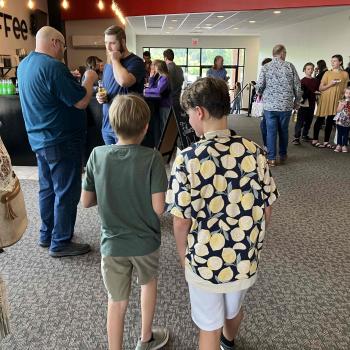In Doctrine in the Greater Christian Community, I hope to challenge our approach to doctrine. Do we white-knuckle secondary doctrines at the expense of our unity with the Body of Christ? Are there primary doctrines that bind us to other Christians regardless of our brand? Once we understand our doctrine, nearly everything else is integration.
We integrate our faith and life, our faith and beliefs, our faith and vocations, etc. Integration is a way of drawing from various disciplines in the search for truth, with the conviction that if something is truly true, then it probably comes from God.[1]
i. One of the issues that muddies the water in our society is pluralism
Are all of my doctrines still important in light of other Christian beliefs?
Among Christians, we often struggle with our dogmas. There are doctrines that Christians hold to, which are at the core of who we are. For instance, I hail from a Full-Gospel background. Over time, I have also waded into an Arminian/Wesleyan stream.
From this backdrop, I can develop a rule of life for family, ministry, teaching, counseling, etc. Does this backdrop fill in all the details? No, but if one is to paint on canvas, one always starts with the background. The details follow in complimentary creativity.
Is Christianity just one of many religions? Are all religions equal?
What sets us apart as Christians is that we have a common bond. With pluralism, this is not the case. In his classic work, Lesslie Newbigin writes:
“Religious pluralism, on the other hand, is the belief that the differences between the religions are not a matter of truth and falsehood, but of different perceptions of the one truth; that to speak of religious beliefs as true or false is inadmissible. Religious belief is a private matter. Each of us is entitled to have – as we say – a faith of our own. This is religious pluralism, and it is a widely held opinion in contemporary British society.”[2]
The world seems tolerant of every religion except for exclusivists, because they claim to have The Answer. Unfortunately, we Christians are considered exclusivists. So we have a hurdle to overcome before we even attempt to integrate our Christian beliefs with theories or practice. Our religion isn’t often accepted at the table.
ii. My background in integration . . . in brief
At youth camps when I was a teen, I often wound up talking with other teens about life issues. My dad preached at up to four youth camps every summer. I knew that other teens approached me, hoping to glean some glimpse of his wisdom from me. Consequently, I showed an interest in talking with others, something my dad referred to as Christian counseling. He spoke to me about colleges like Biola who specialize in it.
My wife Crystal and I graduated from Bethany College (Scotts Valley, CA). I have a B.A. in ministry and psychology. We eventually made the leap to Missouri, where I entered the counseling program at the Assemblies of God Theological Seminary (AGTS).
In those days, the primary problem with integration was that there were very few texts on the subject. To fulfill state licensure requirements, almost every course had a primary textbook. The shelves of my library began to fill up with books that were written with little or no reference to anything spiritual, much less Christian.
I thought I was not only going to learn a Christian theory of counseling, but a Spirit-filled one
I was surprised to find that there were not many Christian theorists at that time. Thankfully, teachers in both my Christian undergrad and seminary exhibited an honest reverence for Theology. They recognized the issue and made us students do the difficult work of integration with our faith.
Although few textbooks were being written by Christians back then, our teachers recommended, and often required readings, in books and journals by tremendous Christian practitioners. Integration was required in our projects and in our class discussions. This focus on integration taught us to do interdisciplinary study.
iii. Integration and good food
When thinking about integration, there are good models to choose from, how-to and D-I-Y books. I can recommend what was required reading for me.
I would recommend Carter and Narramore’s, The Integration of Psychology and Theology: An Introduction.[3] The book is a small, easy to read, modern day classic. Another simple read is by Harold Faw, Psychology in Christian Perspective: An Analysis of Key Issues.[4]
Clyde and Narramore focus on integration. Faw covers integration, but branches out into other areas of psychology as well. Each proposes various levels of integration.
For some reason, I seem to think in terms of food when I think of levels of integration. Is Christianity and psychology like good old fashioned meat and potatoes? We can understand a good steak, but how are the potatoes cooked? Are they mashed, baked, scalloped, fried, french fries, etc.? We can be pretty picky about our potatoes, as many Christians can be about what type of psychology we wish to imbibe.
The meat and potatoes are neatly separated, albeit on the same plate. Perhaps another level of integration is to think about a good tossed salad, various whole pieces of food, all mixed up in one bowl. It seems that a lot of what we call integration is like tossed salad.
Now consider a good meal
I borrow directly from the thought of one of my professors who says he can’t stand it when he serves a meal and his guests automatically start salting the food. Have they helped him prepare the meal? Do they know what spices he has already added, including just the right amount of salt? Have they stopped to think about what is already prepared for them? Must they really add salt?
How often do we approach an interdisciplinary study in the same way? Are we critical of the work before considering how much salt and light has already been included? Of course my professor’s example serves as a critique for Christians who have a slight bias against integration.
I like to think about good foods that are cooked down together by a master chef. For those who like meat and potatoes, what is better than a thick, brothy stew? I like hispanic foods. There is no sweet salsa I have ever tasted that’s better than my wife’s. It’s a perfect combination of fresh vegetables and ingredients cooked down all day long.
With the good meal served by the professor, or my wife’s salsa, a master is at work. We may not be able to perceive every ingredient, or the exact measure of salt, but we can eat with thankfulness knowing that it is delicious and nourishing. Good integration seems to operate in a similar way.
iv. If only integration were this simple
There are dialogues at higher levels that affect our collegians and grad students, not always for the better. What books do we choose? How will they affect our accreditation? At the master’s level in the social sciences, what courses and books will fulfill the state educational requirements for licensure?
Who can write the necessary materials from a Christian perspective? How well-versed is a Theologian in the social sciences? How pure is the Theology of a psychologist? Can we truly teach or write in more than one discipline?
Even if one has all the credentials, what is his theory? What stream of Theology is he in? What are his research interests?
These are just a few dilemmas of integration that are really out of our hands before we ever begin.
v. Integration is like clam chowder
 Tobias Kleinlercher, Clam chowder in a Boudin sourdough bowl at Pier 39 | 2016
Tobias Kleinlercher, Clam chowder in a Boudin sourdough bowl at Pier 39 | 2016
One last food illustration, if you’ll allow it. Good integration is like clam chowder. Crystal and I both love clam chowder, but for various reasons.
I was raised closer to the ocean and excellent seafood. I like seafood and like tasting the clams in the chowder. She likes potato soup. For her, good clam chowder is like seafood flavored potato soup, with a limited amount of clams.
We both agree that it is best served in a sourdough bowl, particularly San Francisco sourdough. The best clam chowder, perfectly balanced for both of us, is at Chowders at Fisherman’s Wharf in Frisco.
We have some close friends with their own criteria for chowder. They believe there is no better chowder than what is served at Ivar’s in Seattle.
We all love SF and Seattle, Chowders and Ivar’s Chowder, but each couple has their own preference. In both places the chowder is phenomenal, prepared by fresh seafood culinary artisans. We are simply lost in a common meal with each other, in the moment, in the atmosphere.
Good integration is capable of something similar.
vi. Questions to Consider
Is it okay for Christians not only to integrate well, but to captivate us with what they’ve prepared?
Does Christian thought only amount to hermeneutics or a branch of Theology?
Is psychology only social scientific research?
Or is there a masterful level of artistry to aspire to?
Can we weave together the truths of our ancient Kingdom with social scientific advances within the last ten years?
Perhaps Jesus would answer . . . “Therefore every scribe who has been trained for the kingdom of heaven is like the master of a household who brings out of his treasure what is new and what is old” (Matthew 13.52, NRSV).
[1] Paul talks about God’s revealed truths in creation, especially in Romans 1. A related discipline, Natural Law perhaps finds its roots in Thomist philosophy/doctrine. Even Calvin consistently says things like all truth is God’s truth. For a classic discussion on the unity of truth, for Christians who are also interested in psychology, see the small book: John D. Carter and S. Bruce Narramore, The Integration of Psychology and Theology: An Introduction (Grand Rapids, MI: Zondervan, 1979). [2] Lesslie Newbigin, The Gospel in a Pluralist Society (Grand Rapids, MI: Wm. B. Eerdmans, 1989), 14. [3] Carter and Narramore (see note 1). [4] Harold Faw, Psychology in Christian Perspective: An Analysis of Key Issues (Grand Rapids, MI: Baker Academic, 1995).












